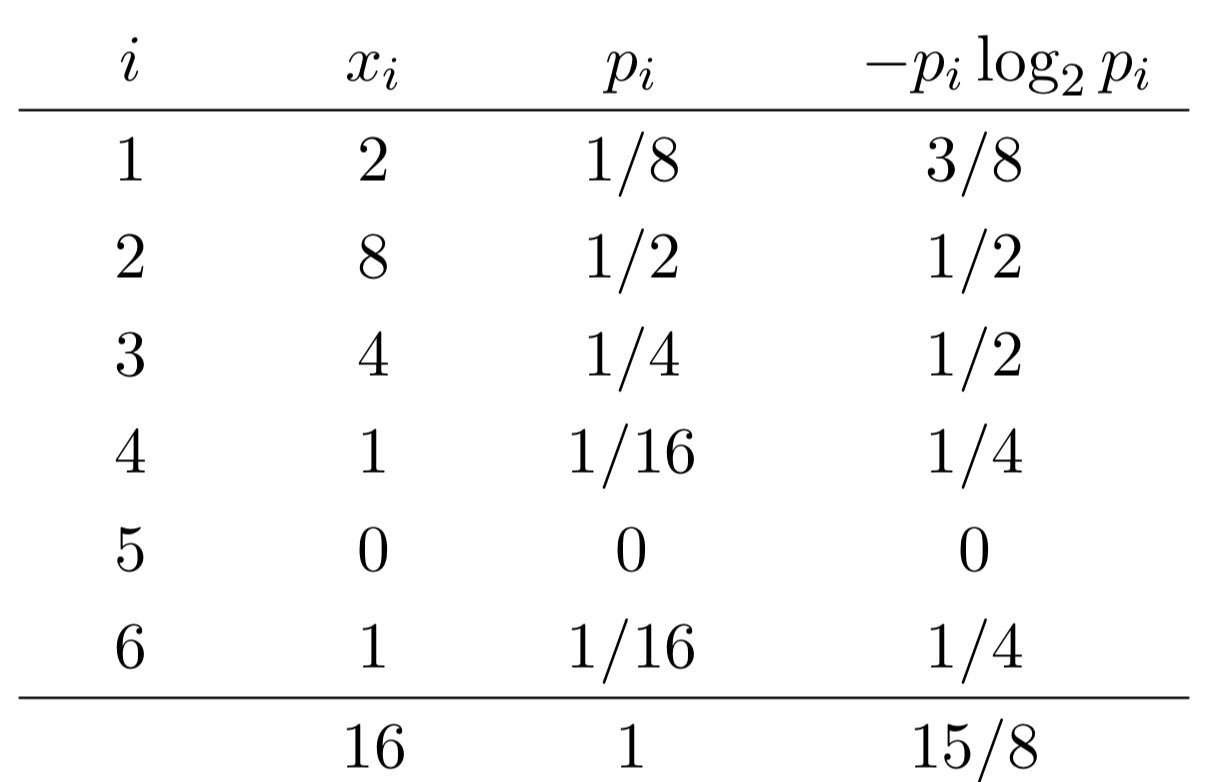Coursera - Computer Science: Programming With A Purpose
Week 4: Input And Output - Shannon Entropy
Write a program ShannonEntropy.java that takes a command-line integer m; reads a sequence of integers between 1 and m from standard input; and prints the Shannon entropy to standard output, with 4 digits after the decimal point. The Shannon entropy of a sequence of integers is given by the formula:
H = -(p1 log2 p1 + p2 log2 p2 + … + pm log2 pm)
where pi denotes the proportion of integers whose value is i. If pi = 0, then treat pi log2 pi as 0.
~/Desktop/io> javac ShannonEntropy.java
~/Desktop/io> cat fair-coin.txt
1 1 1 1 2 1 2 1 1 2
2 2 2 2 1 2 1 2 2 1
~/Desktop/io> java ShannonEntropy 2 < fair-coin.txt
1.0000
~/Desktop/io> cat loaded-die.txt
3 2 6 2 4 3 2 1 2 2 1 3 2 3 2 2
~/Desktop/io> java ShannonEntropy 6 < loaded-die.txt
1.8750
~/Desktop/io> java DiscreteDistribution 1000000 80 20 | java-introcs ShannonEntropy 2
0.7221
~/Desktop/io> java DiscreteDistribution 1000000 80 20 | java-introcs ShannonEntropy 2
0.7217
Step-by-step calculation. Consider the following sequence of 16 integers generated from a loaded die.
3 2 6 2 4 3 2 1 2 2 1 3 2 3 2 2
This table shows the frequencies xi, the proportions pi, and the −pi log2 pi terms:

The Shannon entropy is 1.875 = 15/8.
The Shannon entropy is a measure of the rate of information produced by a random source, such as the outcomes of flipping a fair coin or rolling a loaded die. It is a fundamental concept in information theory and data compression.
Note: the above description is copied from Coursera and converted to markdown for convenience
Solution:
public class ShannonEntropy {
public static void main(String[] args) {
final int m = Integer.parseInt(args[0]);
int count = 0;
final int[] proportions = new int[m];
while (!StdIn.isEmpty()) {
int number = StdIn.readInt();
proportions[number - 1]++;
count++;
}
double h = 0.0;
double p = 0.0;
for (int i = 0; i < proportions.length; i++) {
if (proportions[i] != 0) {
p = (proportions[i] / (double) count);
// log2N = log10(N)/log10(2)
final double a = Math.log10(p);
final double b = Math.log10(2);
final double pi = -(p * (a / b));
h += pi;
}
}
StdOut.printf("%.4f", h);
}
}
Link To: Java Source Code